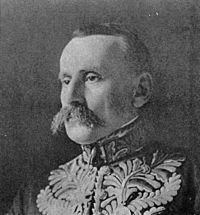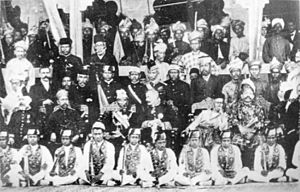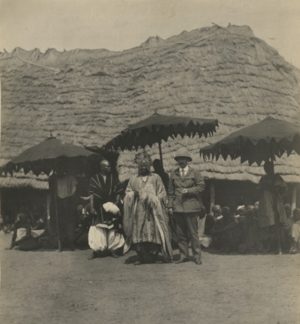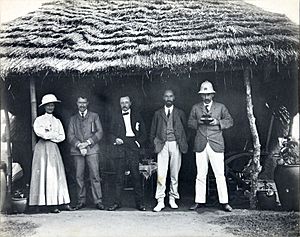Walter Egerton facts for kids
Quick facts for kids
Sir Walter Egerton
|
|
|---|---|
 |
|
| Governor of British Guiana | |
| In office 5 July 1912 – 15 April 1917 |
|
| Monarch | Queen Victoria Edward VII |
| Preceded by | Frederick Mitchell Hodgson |
| Succeeded by | Wilfred Collet |
| Governor of Southern Nigeria | |
| In office August 1904 – 1912 |
|
| Preceded by | Ralph Moor |
| Succeeded by | Frederick Lugard |
| Governor of Lagos Colony | |
| In office 1903 – 28 February 1906 |
|
| Preceded by | William MacGregor |
| Succeeded by | Post abolished |
| Resident, Negeri Sembilan | |
| In office 1902–1903 |
|
| Preceded by | Henry Conway Belfield |
| Succeeded by | Douglas Graham Campbell |
| Acting Colonial Secretary of Straits Settlements | |
| In office 1899 – 5 July 1901 Serving with Charles Walter Sneyd-Kynnersley
|
|
| Preceded by | Sir James Alexander Swettenham |
| Succeeded by | Sir William Thomas Taylor |
| Lieutenant-Governor of British New Guinea | |
| In office 1895–1897 |
|
| Preceded by | New creation |
| Succeeded by | George Le Hunte |
| Administrator of British New Guinea | |
| In office 1888–1895 |
|
| Preceded by | John Douglas as Special Commissioner of British New Guinea |
| Succeeded by | Post abolished |
| Personal details | |
| Born | 1858 |
| Died | 22 March 1947 (aged 88–89) Fair Meadow, Mayfield, Sussex, United Kingdom |
| Nationality | British |
| Spouse |
Ada Maud Sneyd-Kynnersley
(m. 1905; died 1934) |
Sir Walter Egerton (1858 – 22 March 1947) was an important British official. He worked for the British Empire for many years. He held high-ranking jobs, including being the Governor of several places. These included the Lagos Colony (1904–1906), Southern Nigeria (1906–1912), and British Guiana (1912–1917).
Contents
Early Career and Roles
Walter Egerton was born in 1858 in Exeter, England. He was the only son of Walter Egerton, a gentleman. He went to Tonbridge School for his education.
In 1880, when he was about 21, Egerton moved to the Straits Settlements. This was a group of British territories in Southeast Asia. He started his career there as a cadet. For several years, he worked in the Straits Settlements and in Malaya.
- In 1880, he served as a Magistrate in Singapore.
- By 1883, he became a Collector in Penang.
- He also worked as a Commissioner of the Court of Requests in Penang.
- In 1894, he became the Acting Resident there.
- In 1888, he was an acting First Magistrate in Penang. He later got this job permanently.
Egerton also studied law. He became a lawyer in 1896. Between 1899 and 1901, he served as the Acting Colonial Secretary for the Straits Settlements.
Egerton was a Resident in Negeri Sembilan from 1902 to 1903. This was a protected state in Malaya. In this role, he dealt with local laws. He helped change a law about children born outside of marriage. He believed these children should stay with their mothers. The Sultan of Perak supported his decision.
By 1903, Egerton had over 20 years of experience. He had worked in colonial service in the Far East. This experience helped him when he became Governor of Lagos Colony. A road in Seremban, Malaysia, was once named Egerton Road in his honor.
Governorship in Nigeria
In 1903, Egerton became the Governor of Lagos Colony. This area covered much of the Yoruba lands in what is now Nigeria. The British government wanted to combine Lagos Colony with the Southern Nigeria Protectorate.
- In August 1904, Egerton was also made High Commissioner for the Southern Nigeria Protectorate.
- He held both jobs until February 28, 1906.
- On that date, the two areas officially joined together. Egerton became the Governor of the new Colony and Protectorate of Southern Nigeria. He held this position until 1912.
In the new Southern Nigeria, the old Lagos Colony became the Western Province. The former Southern Nigerian Protectorate was divided. It became the Central Province, with its capital at Warri. It also became the Eastern Province, with its capital at Calabar.
When Egerton took office, parts of southeast Nigeria were not yet under British control. He started a plan to send out patrols each year. These patrols usually got people to agree to British rule. They often did this by showing their strength, without needing to use force.
Developing Infrastructure
When Egerton became Governor of Lagos, he strongly supported building railways. He wanted to extend the Lagos – Ibadan railway line to Oshogbo. This project was approved in November 1904. Construction began in January 1905. The railway reached Oshogbo by April 1907.
Egerton preferred railways over river transport. He pushed for the railway to be extended even further to Kano, passing through Zaria. He also supported building many roads. His predecessor, Sir Ralph Denham Rayment Moor, had created laws that allowed unpaid local workers to build these roads.
Egerton also wanted to improve trade. He believed that local traders and those in Calabar were harming the trade along the Cross River. He worked to change rules that limited competition. He eventually convinced officials to reverse their decisions.
Egerton strongly believed in developing the colonies. He thought it was okay for a colony to spend more money than it earned at certain times. This idea was seen in his budgets from 1906 to 1912. He often had to work hard to get these budgets approved by the colonial office.
By 1908, Egerton supported creating a proper Department of Agriculture. This department was established in 1910. Egerton also encouraged the growth of rubber plantations. He knew about this from his time in Malaya. He arranged for land to be rented for this purpose. This led to a very successful industry. He also saw great potential in the tin fields near Bauchi. He thought a railway line to these fields would be useful if they proved profitable.
Challenges and Policies
Egerton had disagreements with the administration of Northern Nigeria. They argued about several things:
- Whether Ilorin should be part of Southern Nigeria (because its people were Yoruba) or Northern Nigeria (because its ruler was Muslim).
- How to manage taxes on goods brought from the coast into Northern Nigeria.
- Whether railway lines from the north should end in Lagos or take other routes to the Niger River and the coast.
Egerton was right to object to the proposed line ending at Baro on the Niger. Travel south from Baro to the coast by river was only possible during high water. Even then, it was not always reliable.
The Old Secretariat, Marina building is said to be shaped like an "E" in his honor.
Egerton's government put in place policies that separated Europeans and Africans. For example, Africans were not allowed in the West African Medical Service. It was also stated that no European should take orders from an African. This meant African doctors could not serve in the army. Egerton himself did not always agree with these rules, and they were not always strictly followed.
The legal relationship between the Lagos government and the Yoruba states was unclear. It took until 1908 for Egerton to convince the Obas (rulers) to accept the Supreme Court in their main towns.
Later Career
In 1912, Sir Walter Egerton was replaced by Frederick Lugard. Lugard was appointed Governor-General of both Southern and Northern Nigeria. His job was to unite the two areas. Egerton was then appointed Governor of British Guiana. This was seen as a step down, possibly because of his disagreements with officials.
He served as Governor of British Guiana from 1912 to 1917. In May 1914, he proposed a plan to build a railway. This railway would go from the coast to the Brazilian border, about 340 miles (547 km) long. This new line would help open up gold and diamond fields. It would also support timber collection and farming. The main challenge was getting enough money for the project.
Years later, Egerton famously said, "If you ask what my policy is, I should say 'open means of communication' and if you wish for additional information, I would reply 'open more of them!'" This showed his strong belief in building roads and railways.
Honors and Personal Life
Egerton received several honors during his career:
- In November 1901, he was made a Companion of the Order of St Michael and St George (CMG).
- In 1905, he became a Knight Commander (KCMG) of the same order.
- In 1911, the University of Edinburgh gave him an honorary degree called Doctor of Laws.
In 1905, Egerton married Ada Maud Sneyd-Kynnersley. She was a widow and had received the OBE. After he retired, Egerton lived in England. His wife passed away on December 20, 1934. Egerton lived until March 22, 1947. At the time of his death, he lived in Fair Meadow, Mayfield, Sussex.




